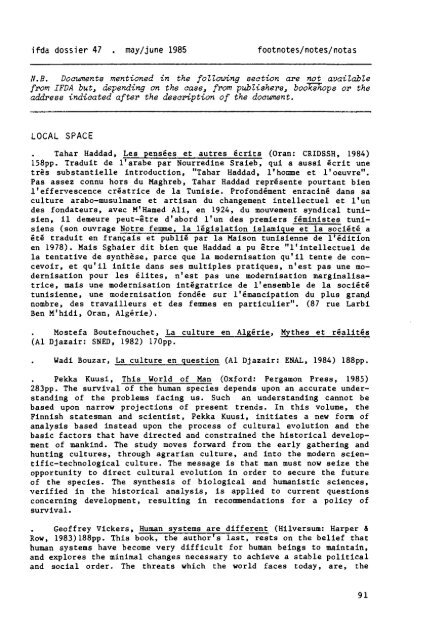Ifda dossier 47, May/June 1985
Ifda dossier 47, May/June 1985
Ifda dossier 47, May/June 1985
Create successful ePaper yourself
Turn your PDF publications into a flip-book with our unique Google optimized e-Paper software.
ifda <strong>dossier</strong> <strong>47</strong> . rnay/june <strong>1985</strong> footnotes/notes/notas<br />
N.B. Documents mentioned in the following section are not available<br />
from IFDA but, depending on the case, from publishers, bookshops or the<br />
address indicated after the description of the document.<br />
LOCAL SPACE<br />
. Tahar Haddad, Les pensees et autres 6crits (Oran: CRIDSSH, 1984)<br />
158pp. Traduit de l'arabe par Nourredine Sraieb, qui a aussi 6crit une<br />
trSs substantielle introduction, "Tahar Haddad, l'homme et 1' oeuvre".<br />
Pas assez connu hors du Maghreb, Tahar Haddad represente pourtant bien<br />
l'effervescence creatrice de la Tunisie. Profondement enracin6 dans sa<br />
culture arabo-musulmane et artisan du changement intellectuel et l'un<br />
des fondateurs, avec M'Hamed All, en 1924, du mouvement syndical tuni-<br />
sien, il demeure peut-etre d'abord l'un des premiers f6ministes tuni-<br />
siens (son ouvrage Notre femme, la legislation islamique et la soci6t6 a<br />
6t6 traduit en francais et public par la Maison tunisienne de 1'6dition<br />
en 1978). Mais Sghaier dit bien que Haddad a pu Ctre "l'intellectuel de<br />
la tentative de synthsse, parce que la modernisation qu'il tente de con-<br />
cevoir, et qu'il initie dans ses multiples pratiques, n'est pas une mo-<br />
dernisation pour les elites, n'est pas une modernisation marginalisa-<br />
trice, mais une modernisation intggratrice de l'ensemble de la soclet6<br />
tunisienne, une modernisation fondge sur 1'6mancipation du plus gran.d<br />
nombre, des travailleurs et des femmes en particulier". (87 rue Larbi<br />
Ben M'hidi, Oran, Algeria).<br />
. Mostefa Boutefnouchet, La culture en Algerie, Mythes et realitss<br />
(A1 Djazair: SNED, 1982) 170pp.<br />
. Wadi Bouzar, La culture en question (A1 Djazair: ENAL, 1984) 188pp.<br />
. Pekka Kuusi, This World of Man (Oxford: Pergamon Press, <strong>1985</strong>)<br />
283pp. The survival of the human species depends upon an accurate under-<br />
standing of the problems facing us. Such an understanding cannot be<br />
based upon narrow projections of present trends. In this volume, the<br />
Finnish statesman and scientist, Pekka Kuusi, initiates a new form of<br />
analysis based instead upon the process of cultural evolution and the<br />
basic factors that have directed and constrained the historical develop-<br />
ment of mankind. The study moves forward from the early gathering and<br />
hunting cultures, through agrarian culture, and into the modern scien-<br />
tific-technological culture. The message is that man must now seize the<br />
opportunity to direct cultural evolution in order to secure the future<br />
of the species. The synthesis of biological and humanistic sciences,<br />
verified in the historical analysis, is applied to current questions<br />
concerning development, resulting in recommendations for a policy of<br />
survival.<br />
. Geoffrey Vickers, Human systems are different (Hilversum: Harper &<br />
Row, 1983)188pp. This book, the author's last, rests on the belief that<br />
human systems have become very difficult for human beings to maintain,<br />
and explores the minimal changes necessary to achieve a stable political<br />
and social order. The threats which the world faces today, are, the
















